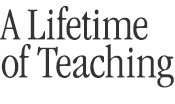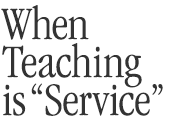

Despite the vital role teachers play, actual public perceptions of teaching are eroding, even in countries like Japan where the profession was once venerated. Rosetta Cohen’s recent research offers insights into how to encourage smart, committed professionals to pursue lifelong careers in teaching—careers in which they remain passionate about their work and they are recognized and valued.
/ Published September 9, 2013
Professor Rosetta Marantz Cohen has been researching how teachers around the world feel about their work, revealing surprising similarities to their American counterparts. Her quest: To redefine the way we think about and value teachers.
In America, teachers often get a bum rap—from parents, school administrators and even from politicians—when in reality the profession is a beleaguered one: teachers are overworked, underpaid and underappreciated. But what about teachers in other countries? Is this solely an American problem or do teachers around the world suffer from the same lack of respect?
In 2009 Rosetta Marantz Cohen, the Sylvia Dlugasch Bauman Professor of Education and Child Study, first turned her attention to this question when she was invited to lecture at a program run by the Institute for Training and Development—an organization that brings together professionals from around the world to share cultures, exchange ideas and deepen understanding.
High school teachers from 28 countries came to Amherst, Mass., as part of a six-week study tour sponsored by the Fulbright organization and the U.S. State Department. Participants were identified as outstanding practitioners in their countries, and many had been teaching for more than 20 years. They wrote extensive, personal, open-ended essays about their training, daily work, attitudes about compensation, and the joys and liabilities of the profession.
Professor Rosetta Cohen explains her ideas about re-inventing the notion of teaching so that it is considered to be more “prestige-brain work” and less “service work.” Clara Rosebrock ’16 produced this Smith podcast for a Digital Media Literacy course.
“I was so impressed with these teachers,” says Cohen. “They were all highly educated and had to compete hard for their teaching positions. They were articulate about the work of teaching, and the stories about their daily experiences in the classroom were compelling,” she says.
As a historian, Cohen has widely researched how the teaching profession has evolved in America, tracing the field’s philosophical underpinnings of service to early contemptuous views that have, unfortunately, overshadowed the field for the past hundred years.
Listening to the international teachers led to a fascinating revelation for Cohen: “American notions about teacher status and prestige, like fast food and reality TV, seem to have been exported worldwide, infecting the field on a global scale.”
“The thesis of the work that I’m now doing is grounded in the idea that as countries become more Western in their orientation, in their economies, and in their outlook and values, the prestige of the teaching profession decreases.”
Global Commonalities
Cohen drilled down her focus to ten teachers hailing from France, New Zealand, Poland, South Africa, Romania, the Philippines, El Salvador, Italy, Brazil and Belgium, whom she selected because of their detailed responses and the range of countries and cultures they represented. She applied a standard coding method to parse the teachers’ essays into thematic categories. Respondents signed waivers allowing Cohen to use their observations, but they asked that she use pseudonyms in her reports.
Over a couple of years, Cohen analyzed the data and summarized her findings in a paper, “The Global Devaluing of Teaching: An International Perspective,” which she presented at the American Educational Research Association in 2012.
While the research is by no means exhaustive, Cohen believes that it is representative and worthy of attention because it provides candid observations about governments and systems that may have otherwise been impossible to collect. Despite vast differences in countries and cultures, Cohen found striking commonalities in the experiences and problems voiced by teachers. In addition to writing articles and giving presentations on her observations, she hopes to publish these findings in a book.

Rosetta Marantz Cohen
“The goal is to get teachers’ voices out there,” Cohen says. “Mindless standardization, student noncompliance and the devaluation of learning—decades-old complaints of American teachers—are the same criticisms now voiced by educators from Germany to China, from Cameroon to Venezuela.” If we’re to improve education, Cohen believes, we have to start by listening to teachers, reinventing the notion of what teaching should be and elevating teaching to be considered “prestige brain work” of the most creative and appealing sort.
A perception of low status
Being undervalued was the most frequently articulated grievance among the teachers Cohen studied. Educational difficulties due to poverty and underfunding—such as overcrowded classrooms, low pay, inadequate resources and low attendance—have been well documented in underdeveloped countries. Yet the narratives in Cohen’s study all reveal a primary concern with the loss of teacher status in both developed and developing countries alike, which Cohen says is rarely noted in any international literature on the topic.
A Romanian teacher who taught through the revolution of 1989 notes the contrast before and after. “Teaching [before the revolution] was easy. The teacher was a supreme being, an institution in itself....The students emulated her as the smartest and most clever in the community. Today, it is very different....Performance is judged according to the speed of financial accumulation....Every country has its ‘American dream,’ and you can become the president of a political party without having read more than two books in your whole life.”
In South Africa, a black teacher felt that the new sense of freedom after apartheid encouraged individuals to distrust and reject authority—in many forms. She writes of the shift: “We teachers were very respected people in the communities at the time....Liberation has undermined the teacher. Freedom has devalued the hard work of learning and studying.”
In all of the narratives, teachers bemoaned the exodus of qualified professionals from the field of education. For example, writes a teacher from Poland: “Bright and resourceful teachers, once quite certain about their teaching vocation, leave schools after a couple of years, seizing the opportunity for...a better life. Schools attract those who have been losing everywhere else.”
The loss of discipline
“As countries become more capitalist in their orientation,” says Cohen, “parents see the work of teaching as less prestigious and less worthy of respect. Their children express the parents’ sentiments by misbehaving.”
A telling example comes from Brazil, where a teacher writes: “In the 20 years I have been in the classroom, I have never seen behavior like today. The world is shrinking, and my students are becoming global citizens, more empowered. But that also means they can treat me like dirt.”
An educator from New Zealand summarizes: “I find that rudeness and disruption is the great leveler...the one thing that seems to bring all children together is their rebellious behavior and their contempt for teachers.”
Standardization
American-style standardization in teaching and testing has stripped away the intellectual component of teachers’ work, contends Cohen. The international narratives underscore the rise in direct government intervention in curriculum. Even in former communist countries like Poland and Romania, where government control has always been rigidly enforced, teachers note the phenomena of “test mania.”
The teacher from Poland writes: “Regurgitators—that’s how I describe my students. The Polish school mostly wants them to open their mouths wide, swallow in great amounts [of information], and vomit at a specified time, that is, during tests and exams....”
Another teacher comments: “The number of standardized tests in Belgium is growing. Whether they are supposed to measure the level of competency, compare students or help select students for different schools, they inevitably fail to demonstrate the higher level of knowledge....They test how much the student has managed to learn about the test itself, not the subject.”
Cohen notes that standardization in American education perpetuates mediocrity, rigidity and unhappiness, just as it’s proving to do elsewhere. “The standardized-test mania is demoralizing and undermining to teachers,” she says. “In the most concrete way, if students don’t perform well on tests—often, I’d contend, for reasons that have little to do with the quality of teaching—teachers are blamed and held accountable.”
Where to from here?
To Cohen, this research suggests how critical America’s direction is to fostering a positive future for educators globally. It also further supports her previous premise that we must move away from the practice of treating schools like corporations. Teachers should be prized for their creativity and inventiveness as much as for their students’ performance on standardized measures.
Cohen points to Finland as a positive example, describing how teachers there express feeling valued and are passionate and deeply interested in their subjects. Both Cohen and her husband and co-author, veteran high school English teacher Samuel Scheer, say that creating this attitude shift in America isn’t only possible, it also doesn’t have to be costly. Steps such as offering teacher sabbaticals, revising hiring practices and evaluation processes, and requiring administrators to teach can ultimately lead to classrooms where teachers are respected and love the work they’re doing. When that happens, students naturally will excel.
“We are the richest and most powerful country in the world,” says Cohen. “What we do, other people do.”
While it’s easy to be pessimistic, if you look at the scope of America’s education history, Cohen says, you’ll see regular swings between progressive and conservative agendas, often based on who wields political power at the time.
Recently, she traveled to Washington for the launch of “The Heart of the Matter,” a report of the American Academy’s Commission on the Humanities and Social Sciences intended to advance a dialogue on the importance of the humanities and social sciences to the future of America.
“This was a major, bipartisan report,” says Cohen. It calls for a change in educational priorities, balancing our present focus on STEM subjects (science, technology, engineering and mathematics) with more work in the humanities and social sciences. It also called for a shift away from bottom-line assessment of students and a renewed focus on the creative potential of teaching.
“It felt like a first step in the right direction for American schooling,” she says.
“If schools in America could become more ‘teacher-centered’—if they could become places where adults felt valued and engaged, it would not only improve teaching outcomes, it would set a global example for others.”




















